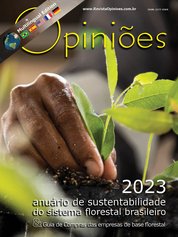Karina Carnielli Zamprogno Ferreira
Gerente de Pesquisa, Planejamento e Sustentabilidade Florestal da Sylvamo
AsCP23
Sustentabilidade: sinônimo de sobrevivência do negócio
Se por um lado é visível que a sociedade contemporânea vive um processo crescente de conscientização ambiental, por outro, é inegável que há muito a ser feito em termos de preservação e sustentabilidade. Ao mesmo tempo em que vivenciamos muitas iniciativas positivas, evidenciamos, também, muitos desafios a serem enfrentados, à medida que a sociedade evolui sua consciência de conservação ambiental. Desse modo, ela dita um modelo de trabalho esperado das organizações, para que a cadeia produtiva esteja alinhada a esses anseios de expansão, modernização e conservação e detenha processos e critérios que atendam aos novos comportamentos de consumo, conectando interesses ambientais ao negócio.
Nunca a sociedade esteve tão preocupada com o futuro do planeta como hoje. Boa parte dessa conscientização foi fortemente acelerada pelas mudanças climáticas e pela escassez de recursos naturais. Rapidamente, as novas gerações assimilaram isso e assumiram um papel fundamental na construção de uma mentalidade ambientalmente sustentável. Além disso, procuraram vivenciar esses conceitos nas suas decisões de consumo, na escolha de melhores empresas para trabalhar, na construção de políticas públicas que regulamentem e promovam a preservação do meio ambiente e toda biodiversidade nele existente.
Nessa linha, o setor florestal já nasceu atrelado a um riquíssimo propósito ambiental de minimizar as práticas de extração predatória de madeira nativa via um modelo de produção florestal renovável e que defenda, conserve e recupere florestas nativas. E permanece buscando minimizar impactos, também, na sua cadeia produtiva, admitindo, cada vez mais, práticas conservacionistas de solo e água, selecionando materiais genéticos mais bem adaptados, mais eficientes hídrica e nutricionalmente, e com potencial de suprir a demanda crescente por madeira nos diferentes mercados.
Nessa linha, o setor florestal já nasceu atrelado a um riquíssimo propósito ambiental de minimizar as práticas de extração predatória de madeira nativa via um modelo de produção florestal renovável e que defenda, conserve e recupere florestas nativas. E permanece buscando minimizar impactos, também, na sua cadeia produtiva, admitindo, cada vez mais, práticas conservacionistas de solo e água, selecionando materiais genéticos mais bem adaptados, mais eficientes hídrica e nutricionalmente, e com potencial de suprir a demanda crescente por madeira nos diferentes mercados.
É possível aliar novas tecnologias e sustentabilidade no negócio de papel e celulose, promover a criação de soluções mais limpas e eficientes, minimizando a pressão sobre os recursos naturais e equilibrando desenvolvimento econômico com proteção ambiental. Nesse sentido, a silvicultura brasileira tem um papel fundamental, atuando e incentivando na preservação dos recursos hídricos, na proteção de nascentes e matas ciliares e na manutenção da flora e fauna silvestre em diferentes biomas.
Na Sylvamo, a sustentabilidade é um pilar fundamental do negócio, pois permeia toda a cadeia produtiva e promove o engajamento dos nossos profissionais, que assumem um papel de agentes de sustentabilidade também nas suas interações sociais fora da companhia. As ações de educação ambiental funcionam como uma ponte direta entre sociedade e empresa, aproximando os anseios da nova geração consumidora às melhores práticas da empresa. Tudo isso produz uma combinação positiva que tem dado ótimos resultados na desmistificação da produção do eucalipto, mas, também, desassociando o consumo de papel como uma prática ambientalmente imprudente. Na verdade, ele é uma opção muito mais viável e sustentável para substituir o plástico, por exemplo.
Na Sylvamo, a sustentabilidade é um pilar fundamental do negócio, pois permeia toda a cadeia produtiva e promove o engajamento dos nossos profissionais, que assumem um papel de agentes de sustentabilidade também nas suas interações sociais fora da companhia. As ações de educação ambiental funcionam como uma ponte direta entre sociedade e empresa, aproximando os anseios da nova geração consumidora às melhores práticas da empresa. Tudo isso produz uma combinação positiva que tem dado ótimos resultados na desmistificação da produção do eucalipto, mas, também, desassociando o consumo de papel como uma prática ambientalmente imprudente. Na verdade, ele é uma opção muito mais viável e sustentável para substituir o plástico, por exemplo.
Modelos de negócio que adotam a economia circular em seus processos, transformando resíduos em novos recursos, serão cada vez mais valorizados; assim como as fontes renováveis de energia e as tecnologias de rastreamento e certificação de toda cadeia produtiva trazem visibilidade para o consumidor final e ressaltam o teor de responsabilidade ambiental das organizações.
A concepção antiga de que gestão ambiental eficiente contrasta com a margem de lucro das organizações está ultrapassada. Hoje, os investimentos ambientais não só agregam valor ao negócio, mas também repercutem na imagem das empresas e na sua atratividade para novos investidores, tornando-se um grande diferencial de mercado. Por isso, o propósito da Sylvamo é produzir o papel que as pessoas precisam de maneira responsável e sustentável, comprometida com o sucesso de todo o ecossistema, desde as florestas que amamos às comunidades em que vivemos, pois sabemos que o bem-estar de cada um depende do bem-estar de todos.
A concepção antiga de que gestão ambiental eficiente contrasta com a margem de lucro das organizações está ultrapassada. Hoje, os investimentos ambientais não só agregam valor ao negócio, mas também repercutem na imagem das empresas e na sua atratividade para novos investidores, tornando-se um grande diferencial de mercado. Por isso, o propósito da Sylvamo é produzir o papel que as pessoas precisam de maneira responsável e sustentável, comprometida com o sucesso de todo o ecossistema, desde as florestas que amamos às comunidades em que vivemos, pois sabemos que o bem-estar de cada um depende do bem-estar de todos.




